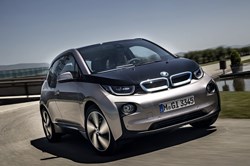The BMW i3 is coming, but will consumers buy in?
BMW gets a lot of credit for its aggressive use of composites in the i3, but consumers still must make the switch to an all-electric lifestyle.

One of the advantages that aircraft manufacturers have is that when they launch a new model, there follows several years of order-taking which, even if not immediately profitable, provides a sense of revenue to come. Even Boeing and Airbus, which switched dramatically to composites with the 787 and A350 XWB respectively, were able build strong order sheets that positively reinforced the faith placed in carbon fiber.
BMW, which has made a similar leap to composites with the all-electric i3, doesn't have the luxury of fixed orders to justify the departure from the norm that the vehicle represents with its carbon fiber composite passenger cell and aluminum chassis. Certainly, however, the company is well known for its smart decision-making, and we assume that much market analysis has gone into the i3's development and sales potential.
Although the car has been, for the most part, positively received, there has also been more than a little second-guessing of BMW, questioning the sales potential of all-electrics in general, and the i3 in particular. Ozzie Zehner, a former GM engineer who worked on the EV1 electric car, and currently a visiting scholar at the University of California, Berkeley, wrote in June in the IEEE Spectrum (spectrum.ieee.org/energy/renewables/unclean-at-any-speed) that electric cars are artificially propped up by government subsidy and, on top of that, not as green as alleged.
Whether truly green or only perceived as green, it's hard to say just how willing consumers will be to spend a lot of money for the jump-shift to an all-electric motor-vehicle lifestyle. And only such a jump-shift of real substance will drive the construction of the charging stations needed to fuel such vehicles.
In any case, BMW is sold on the idea, and deserves much credit for not only being among the first to market (along with the Chevy Volt), but also for adopting the use of carbon fiber composites so thoroughly in structural components. To be sure, other carmakers are watching the i3 with keen interest — as is the composites industry.
Related Content
-
Infinite Composites: Type V tanks for space, hydrogen, automotive and more
After a decade of proving its linerless, weight-saving composite tanks with NASA and more than 30 aerospace companies, this CryoSphere pioneer is scaling for growth in commercial space and sustainable transportation on Earth.
-
Cryo-compressed hydrogen, the best solution for storage and refueling stations?
Cryomotive’s CRYOGAS solution claims the highest storage density, lowest refueling cost and widest operating range without H2 losses while using one-fifth the carbon fiber required in compressed gas tanks.
-
Automotive chassis components lighten up with composites
Composite and hybrid components reduce mass, increase functionality on electric and conventional passenger vehicles.















